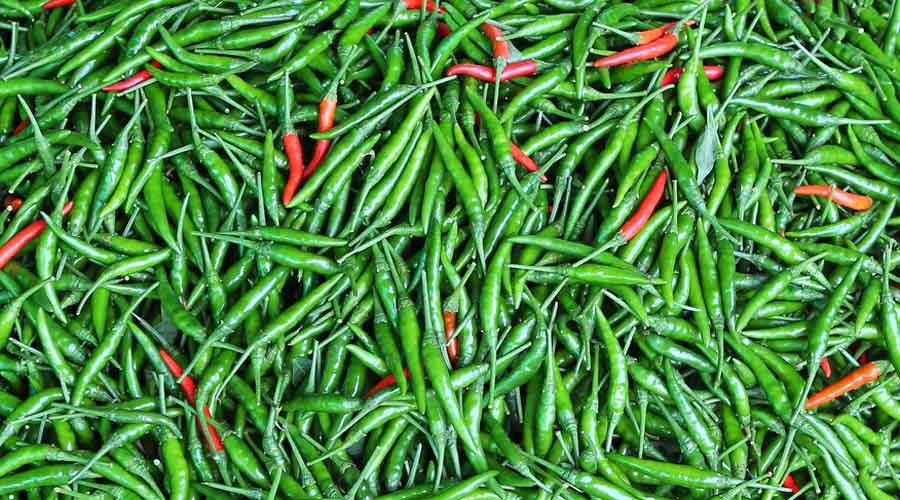The price of green chillies has touched Rs 300 a kilo in the city, up from around Rs 200 a couple of weeks back, with traders blaming the steep hike on erratic supply from other states in the run up to lockdown days.
Green chillies usually sell for Rs 40 to Rs 60 a kilo in the city around this time.
In contrast, the retail price at the Maniktala, Gariahat, Lake market, Entally, Kasba and Behala markets has remained around Rs 300 a kilo for three consecutive days since Saturday.
At other markets, the price varied between Rs 250 and Rs 280 a kilo on Monday.
Bengal produces around 9.5 to 10 lakh tonnes of green chillies a year, compared with its annual demand of eight lakh tonnes. It remains one of the biggest suppliers of green chillies to other states.
But around this time of the year, Bengal has to depend on supplies from other states.
Officials at the wholesale hubs in Sealdah and Howrah said that ahead of the lockdowns on August 5 and 8, trucks carrying chillies from other states got stranded at various points. Also, trucks from Nadia and North 24-Parganas were allegedly stopped at Boro Jagulia, Barasat and Kanchrapara, further widening the gap between the supply and the demand.
“Nine trucks carrying 15 tonnes of green chillies from Aurangabad’s Buldhana were stranded at different points on August 5. The impact was felt almost immediately,” said Kamal Dey, the working president of the West Bengal Vendors’ Association. “The wholesale price of chillies stood at Rs 105 a kilo on August 6. It shot up to Rs 150 the next day as the demand soared.”
Green chillies, like other vegetables, are highly perishable. Traders said a delay of a few hours on transit could result in a loss of nearly 40 per cent of the produce from each bag. Reduced volume and high demand ahead of the lockdown pushed up the price.
“I bought four pallas (one pallah weighs 5kg) of green chillies on Tuesday (August 4) for Rs 110 a kilo from Sealdah. Nearly 25 per cent of the total buy was lost on the two lockdown days. I have no option but to sell the remaining for Rs 300 a kilo,” said Subol Saha, a vegetable vendor at Lake market.
“Since local trains are not running, the bulk of the supplies from the districts to Sealdah is dependent on trucks. There are obstacles on the roads, I’m told,” said Pradip Mazumder, adviser to chief minister Mamata Banerjee on agriculture and chairman of West Bengal Agro Industries Corporation Limited. “We have started working on these bottle-necks.”
Police officers said there were complaints that trucks carrying vegetables were being stopped. “Orders have been sent to the police superintendents to ensure it doesn’t happen,” said an officer.
The state government has decided to regularly monitor the prices of some essential commodities such as potatoes and chillies.
The price of potatoes, too, has risen from Rs 25 a kilo a few weeks ago to Rs 35. At a meeting in Nabanna last week, potato producers were asked to ensure that the Jyoti variety reached wholesale markets at Rs 23 a kilo.











